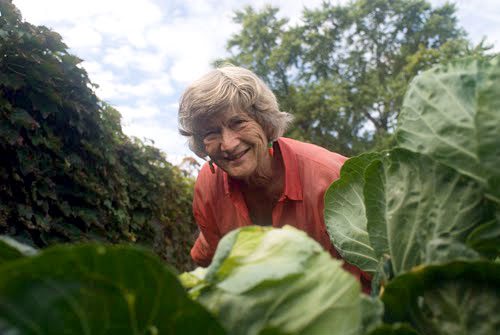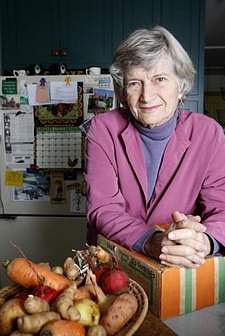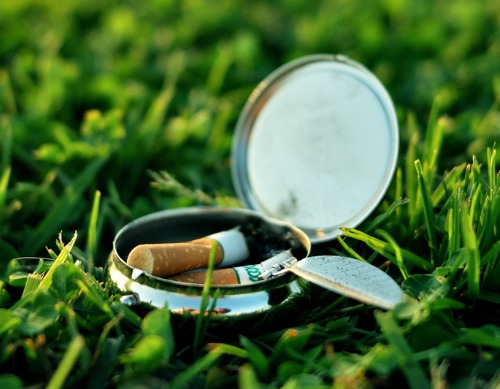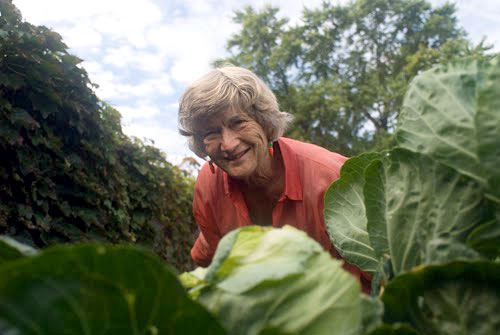A version of this post first appeared on Civil Eats
 Joan Gussow in her garden.Photos: Chelsea GreenFew would argue that Joan Dye Gussow is the mother of the sustainable food movement. For more than 30 years, she’s been writing, teaching (she is emeritus chair of the Teachers College nutrition program at Columbia University), and speaking about our unsustainable food system and how to fix it. (This excellent article by journalist Brian Halweil showcases her work in detail.) Now more than ever, her ideas have wings. Michael Pollan, for example, has said, “Once in a while, when I have an original thought, I look around and realize Joan said it first.”
Joan Gussow in her garden.Photos: Chelsea GreenFew would argue that Joan Dye Gussow is the mother of the sustainable food movement. For more than 30 years, she’s been writing, teaching (she is emeritus chair of the Teachers College nutrition program at Columbia University), and speaking about our unsustainable food system and how to fix it. (This excellent article by journalist Brian Halweil showcases her work in detail.) Now more than ever, her ideas have wings. Michael Pollan, for example, has said, “Once in a while, when I have an original thought, I look around and realize Joan said it first.”
Gussow lives what she teaches, growing most of her own food year-round in her backyard. The New York Times profiled her last spring as she was rebuilding her garden after it was destroyed by a flood. When I asked her about her newly rebuilt garden, she said, “It’s given me 10 additional years of life, at least!”
I spoke to her recently about how far we’ve come, the future of the food system, and her new book, Growing, Older: A Chronicle of Death, Life, and Vegetables.
Q. You’ve been talking about food, energy, and the environment for decades. Do you have hope we might finally see big change in the food system?
A. I must say that compared to the reception my ideas got 30 years ago, it’s quite astonishing the reception they’re getting now. I am excited to see the kinds of things that are going on in Brooklyn, for example. People are butchering meat and raising chickens — it’s become the sort of “heartland” of the food movement. But whether or not there’s going to be sea change in the whole system is so hard to judge. I am politically very discouraged, because of what happened in the [last] election and what’s happened with our president, whom we elected with such hope. He seems completely unable to get really, really passionate about anything.
Do I have hope? Yes, I have hope because, as Michael Pollan wrote in The Omnivore’s Dilemma, what it means to say that something is “unsustainable” is that it will stop. And we have an unsustainable food supply. I believe the short-sightedness of both national and international leaders and their inability to do anything useful politically is so stunning that we’re going to come to a crisis period much sooner than anyone expects. But what I really believe is hopeful is that there are so many experiments going on on the ground now all over the country, everything from [Growing Power’s] Will Allen to what’s going on in Hardwick, Vermont, and the Slow Money movement putting money into agriculture and the food system. There’s going to be models out there when we need them.
Q. What do you think went wrong the first time around with the “Back to the Land” movement? And how can this generation get things right this time?
A. Seeing young people in agriculture is so promising. However, I also know people who’ve hung in there, who are in their 40s or 50s, who have no retirement and no health insurance, and don’t know how long they can continue to farm.
We’re only set up right now for those people to make a living in a situation where there are enough rich people to buy their food at a decent price. I know there are all kinds of groups working to make good food accessible to poor people, but the reality is that you can’t go into a supermarket for the most part and get anything good for someone in that situation to eat. And there is still a class divide, an economic divide between the foodie movement, if you like, and the reality of the world.
In 1980, they had just brought out a report at the USDA that studied organic foods. There was so much hope. There was an alternative energy center in the upper Midwest, and I remember getting a newsletter from them that was dated January 1980, and showed all of the things they were trying, and I wrote at the top, “The End.” Because it was clear that Reagan would just kill it all, and he did. He took the solar panels off the White House roof, he fired the one person at USDA focused on organic agriculture, and he sent us back 20 years. And it was very hard at that point to keep the momentum going because there was no money in it. At least now there is money around the fringes. The thing that is different now is that it’s got publicity, it’s caught the eye of the press — which is of course dangerous, too.
Q. How so?
A. We’re such a faddish country. And of course you’ve noticed there is a real blowback. These attacks on “local” saying how naive it is, how its better to import your lamb from New Zealand. And then you have the corporations gathering together to do a publicity campaign. The last one I saw was that the meat industry is getting together to push back against this notion that this way that we’re raising animals is not healthy.
Q. Do you think this is the last gasp of industry, or do you think they can mobilize that other 80 percent against this growing movement?
[Laughs] Oh they have many more gasps left. I believe that’s the reason that you have to keep hope alive, you have to keep moving along the way you believe in and keep telling the truth and trying to get the word out. Because the reality is that the pressure is on the other side. There’s a lot of money at stake, and they’re not giving up their livelihoods.
 Q. How is the field of nutrition different now from when you first started teaching your “nutritional ecology” course?
Q. How is the field of nutrition different now from when you first started teaching your “nutritional ecology” course?
A. The existence of farmers markets, CSAs, all these things have in a sense forced the profession to move. [But] there’s a huge resistance. I gave the keynote address at Teachers College, in which I talked about giving up nutrients [because] we don’t know enough. Like, what is the ideal mix of fat, carbohydrates, and protein? We don’t even know that. And when it comes to micro-nutrients, we are really up a tree.
The fact of the matter is that we’ve allowed people to be led astray. Michael [Pollan, in In Defense of Food] identified that moment when the FDA said that if a food is essentially equivalent, you didn’t have to call it imitation. Once you could restore the nutrients and say something is nutritionally equivalent, we allowed ourselves to be lulled into thinking that as long as it met nutrient requirements, it was healthy. [Yet] here we have this abundant food supply … and this incredibly unhealthy population. The level of obesity, the level of diabetes — all these things are shocking.
Michael [Pollan]’s advice in th
at book, which is to get off the Western diet, is really the right advice. And if I had tried to say that 20 years ago, it wouldn’t have been possible. There was no place to go to buy foods that were not so processed, to get meat that was raised right, or many types of fresh fruits and vegetables.
Q. In Growing, Older you write about how “having possibilities” means freedom from despair in the face of climate change, resource depletion, biodiversity loss, soil loss, etc. Could you explain how that works for you?
A. Temperamentally, I’ve never been the sort of person who looks ahead in my life and gloomily assesses the future. Maybe at this point I should be doing that a little bit more. [Laughs.] I have to say that [I have possibilities] because I don’t know what the answers to anything are going to be. Like when my garden was totally destroyed last March, people were sort of astounded that I didn’t fall apart. And I spent the whole summer rebuilding it two feet higher.
If someone had told me that I would look upon what happened [in 2010] as a blessing, I’d have thought they were out of their mind. I am not a religious or superstitious person, but I honestly believe that Mother Nature took care of me in the spring. She looked down and she said, “Joan you’re not getting any younger, this yard is getting worse and worse. It’s getting wetter all the time because the tides are rising. You have access to your land from the north for the first time in 100 years because someone has torn down a house and isn’t going to build until April, and you have the first ever advance that you’ve ever gotten on a book, so you can pay for it.” So, wham. And that’s what it feels like, it feels like I was given this gift. Now I couldn’t have forecast that, I couldn’t have wished for that.
If there’s anything that worries me, really worries me deeply, it’s how we’re going to overcome American and modern peoples’ detachment from the natural world, and how we’re going to get them connected again. Unless we’re connected, we’re never going to be able to save the planet. I mean we can’t isolate ourselves in these boxes that are artificially maintained by energy that we don’t even recognize as maintaining us, and save the planet. We have to be in touch with what the planet is calling out for us to do.
Q. What is it about gardening that inspires you?
A. It provides so many rewards. There is so much beauty out there and there is so much interest out there, and there are so many wonderful plants and animals sharing your life with you out there. Katherine Hodgson Burnett wrote that “to have a garden is to have a future, to have a future is to be alive.” That’s my theme for my old age.
Q. In a chapter called “My Obituary,” you write about how you would like to be remembered. What do you want your legacy to be?
A. I’d love to be remembered as having a sense of humor. I was most pleased when some of my students told me I should go into stand-up environmental comedy. I would like to be remembered as having tried to tell the truth.
Q. I feel like the food movement has difficulty in trying to explain to people that reducing their consumption is actually a net benefit for them, that it’s not about deprivation, but about life improvement.
A. I obviously feel that the life that I live, in which I attempt to consume minimally, and don’t waste things and don’t buy things often, I consider it very life-affirming. I really do believe that people would be so much happier and creative if they had some limitations and if they acknowledged their limitations. What I love about the way I eat, for instance, is that basically I eat what is available. Going to the supermarket to try to figure out what to eat is so deadly to me. It doesn’t feel good at all. What does feel good is that you don’t have to go out and shop, you can make do with what you have.
Q. The common wisdom says that if we don’t buy stuff, the economy will collapse. How do you respond to that?
A. My brilliant young friend Jennifer Wilkins, who writes a monthly column up in Ithaca, was at my house at Thanksgiving and was looking at the paper about Black Friday. And she decided to write about the sudden changeover from these Thanksgiving values, which is the only really non-commercial holiday we have, where you’re not asked to buy cards or go shopping for gifts, you just buy food and you eat.
She wrote about how Black Friday is the opposite: get out there and spend. And when you don’t spend, you aren’t helping the merchants, and the economy doesn’t recover. She also talked about “Buy Nothing” day, and she goes on and says that the answer is not to buy nothing, it’s to invest your money in things that make a difference, and that help grow the things that matter to you, like local food and local merchants, or having a meal with friends. Something that promotes your values, which is sort of the premise of the Slow Food movement. When you put your money down, where is it going to go? What is your money doing out in the world? If we need to keep spending to keep the economy going, we just have to start deciding which economy, which parts of the economy do we want to grow? And if what we want to grow is a sustainable local food system, then we need to put our money where our hearts are.




